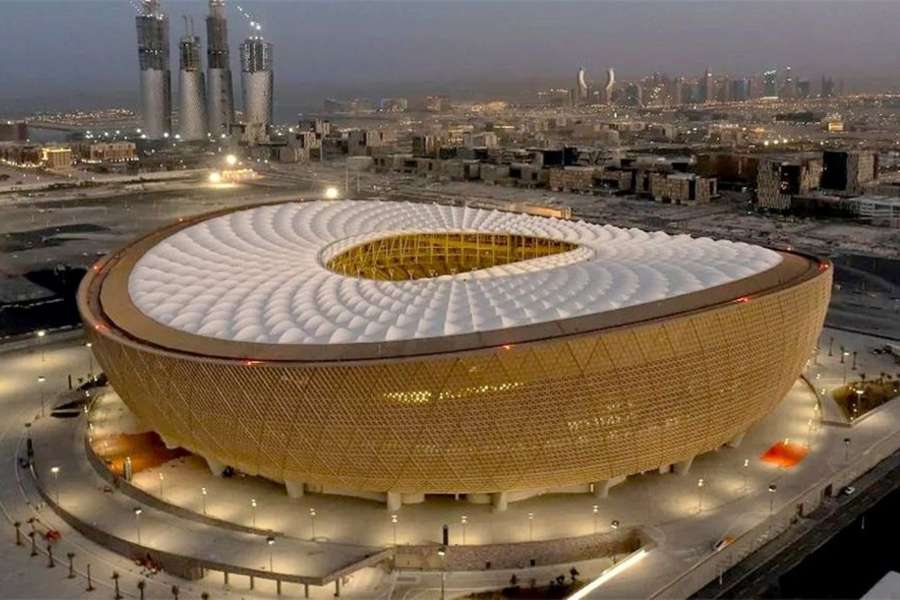Air conditioning to containers: Qatar's World Cup stadiums

Construction work began in November 2015 and seven years later, architecturally and technologically impressive football stadiums have sprung up out of the desert.
Apart from Al Khor, where nine matches will take place, all the other stadiums are located in the city limits of Doha. Unlike in previous tournaments, the teams will stay in the same hotel for the duration of the championship and will have the same training facilities. For the first time ever, every stadium will host matches in the knockout phase.
Seven of the eight grounds were built for the championships, with the only pre-existing Khalifa International Stadium in Doha undergoing a costly renovation. The last three were inaugurated last November during the Arab Cup, which was a dress rehearsal for the World Cup. All the stadiums have air conditioning that can lower the temperature to 20C.
At this time of year, temperatures in Qatar reach 30C. "We are not only cooling the air, we are also cleaning it for the audience. For example, allergy sufferers won't have problems inside our stadiums, our stadiums have the cleanest air there can be," the FIFA website quoted Professor Saud Abdulaziz Abdul Ghani of Qatar University, who was in charge of the air conditioning system.
The World Cup will be played in eight stadiums, the fewest since 1978.
Al Bayt
The name of the stadium is derived from the term "bayt al sha'ar", which were tents used by nomads in the Persian Gulf region. Because of this, its appearance evokes those nomadic shelters.
Located in the town of Al Khor, 35 kilometres north of Doha, the stand has a capacity of 60,000 spectators and will host the opening match of the championship between the hosts and Ecuador.
Al Bayt Stadium's fixtures: Qatar v Ecuador, Morocco v Croatia, England v USA, Spain v Germany, Netherlands v Qatar, Costa Rica v Germany, Round of 16, quarter-final, semi-final
Lusail
The largest stadium of the upcoming tournament, the stands in Lusail will hold 80,000 people. The elegant structure, which catches the eye with its golden exterior, will be the venue for the final on December 18.
After the World Cup, the stadium is to be converted into a centre with shops, restaurants and a health clinic.
Lusail Stadium's fixtures: Argentina v Saudi Arabia, Brazil v Serbia, Argentina v Mexico, Portugal v Uruguay, Saudi Arabia v Mexico, Cameroon v Brazil, round of 16, quarter-final, semi-final, final
Al Janoub
The unusual shape of the southernmost stadium, or rather the shape of its roof, is inspired by the sails of traditional vessels used by pearl hunters.
It has a capacity of 40,000 seats, opened in 2019 and was designed by the famous British architect of Iraqi origin Zaha Hadid.
Reigning world champions France will enter the championship here, with Australia playing all their group matches in Al Janoub.
Al Janoub Stadium fixtures: France v Australia, Switzerland v Cameroon, Tunisia v Australia, Cameroon v Serbia, Australia v Denmark, Ghana v Uruguay, round of 16
Ahmad bin Ali
The ground was built on the edge of the desert by rebuilding an old stadium, from which more than 80% of the building material was used. Its capacity is the same as six of Qatar's eight World Cup arenas: 40,000 seats. Here, too, inspiration came from local realities.
"The intricate facade reflects the undulations of the sand dunes, while the geometric patterns capture the beauty of the desert and the local flora and fauna," the organisers said on the World Cup website.
Ahmad bin Ali Stadium fixtures: USA v Wales, Belgium v Canada, Wales v Iran, Japan v Costa Rica, Wales v England, Croatia v Belgium, round of 16
Education City
Last February, this stadium hosted the final of the Club World Cup, as Bayern Munich beat Mexico's Tigres 1-0. The name reflects the fact that the stadium is surrounded by a number of universities, museums and the Qatar National Library.
The facade, with triangles forming geometric diamond-shaped patterns, changes colour according to the sun's movement across the sky, and at night it hosts digital light shows.
Education City Stadium fixtures: Denmark v Tunisia, Uruguay v South Korea, Poland v Saudi Arabia, South Korea v Ghana, Tunisia v France, South Korea v Portugal, round of 16, quarter-final
Khalifa International
Doha's multi-purpose stadium was opened in 1976 and underwent extensive renovations prior to the tournament.
Among other things, it was given a new floor as well as 12,000 new seats and a roof, while retaining its centrepiece of massive double arches.
It has hosted several major competitions, such as the 2019 World Club Championship and the 2019 Athletics World Championships.
It is the home ground of the Qatari national football team.
Khalifa International Stadium fixtures: England v Iran, Germany v Japan, Netherlands v Ecuador, Croatia v Canada, Ecuador v Senegal, Japan v Spain, round of 16, third-place play-off
974
The most unusual stadium of the tournament, 974 shipping containers were used for its construction as a reference to Qatar's tradition of global trade and shipping. 974 is also the international call number of Qatar.
It is the only arena that does not need air conditioning, the main reason being its location right by the sea. After the World Cup, it will be dismantled and the containers reused.
Stadium 974 fixtures: Mexico v Poland, Portugal v Ghana, France v Denmark, Brazil v Switzerland, Poland v Argentina, Serbia v Switzerland, round of 16
Al Thumama
The design of the circular and bright white stadium symbolises the keffiyeh, the traditional male headdress. After the World Cup, it will be partially dismantled, its capacity halved, and a sports clinic and hotel will be built inside, among other things.
It will be used for the third match of the tournament between Senegal and the Netherlands.
Al Thumama Stadium fixtures: Senegal v Netherlands, Spain v Costa Rica, Qatar v Senegal, Belgium v Morocco, Iran v USA, Canada v Morocco, round of 16, quarter-final

